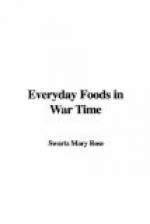Herbs and spices have from time immemorial given flavor to man’s diet. “Leeks and garlic,” “anise and cumin,” “salt and pepper,” “curry and bean cheese,” are built into the very life of a people. The more variety of natural foods we have the less dependent we are upon such things. Our modern cooks, confronted in the present crisis with restrictions in the number of foods which they may use, may find in bay leaves, nutmeg, allspice, and all their kind, ways of making acceptable the cereals which make a diet economical, the peas and beans which replace at least a part of the meat, and dried fruits and vegetables which save transportation of fresh or canned goods.
Tea and coffee are both flavors and stimulants. They are used literally by thousands to give flavor to bread or rice. Dependence on a single flavor is apt to result in a desire to have it stronger and stronger, and hence less and less wholesome. This is a good reason for some variety of flavor; better tea one meal and coffee another than the same one all the time. Too freely used, and made too strong, tea and coffee may have a bad effect upon the nervous as well as the digestive system. They should never be given to children. It is better for adults to get their flavor from something without such effects. Because the combination of bread and coffee tastes good, one may be deceived into thinking himself well nourished on a diet consisting of little else. And yet this is a very inadequate diet for anybody, and disastrous to the normal development of children. One must be on guard, then, lest one’s desire for flavor be satisfied without the body’s real needs being met.
The wise cook saves her best flavors for the foods which would be least acceptable without them and does not add them to foods which are good enough by themselves. The latter course marks the insidious beginning of luxury. “Once give your family luxuries and you are lost as far as satisfying them economically is concerned,” remarked a clever housewife. “Even a rat will not taste bread when bacon is nigh,” observed a sage physiologist. The demand for flavor grows and grows with pampering, till nothing but humming-birds’ tongues and miniature geese floating in a sea of aspic jelly will satisfy the palate of him who eats solely for flavor—who never knows the sauce of hunger, or the deliciousness of a plain crust of bread. We must be on guard, saying, like the little daughter of a classical professor, “If Scylla doesn’t get me Charybdis will.” Flavor we must have, but not too much, not too many kinds at once, and not applied indiscriminately to foods which need them and foods which do not. The wise cook uses her arts to secure the proper nourishment of the family and not for her fame as “a good cook.”
CHAPTER VIII
ON BEING ECONOMICAL AND PATRIOTIC AT THE SAME TIME




